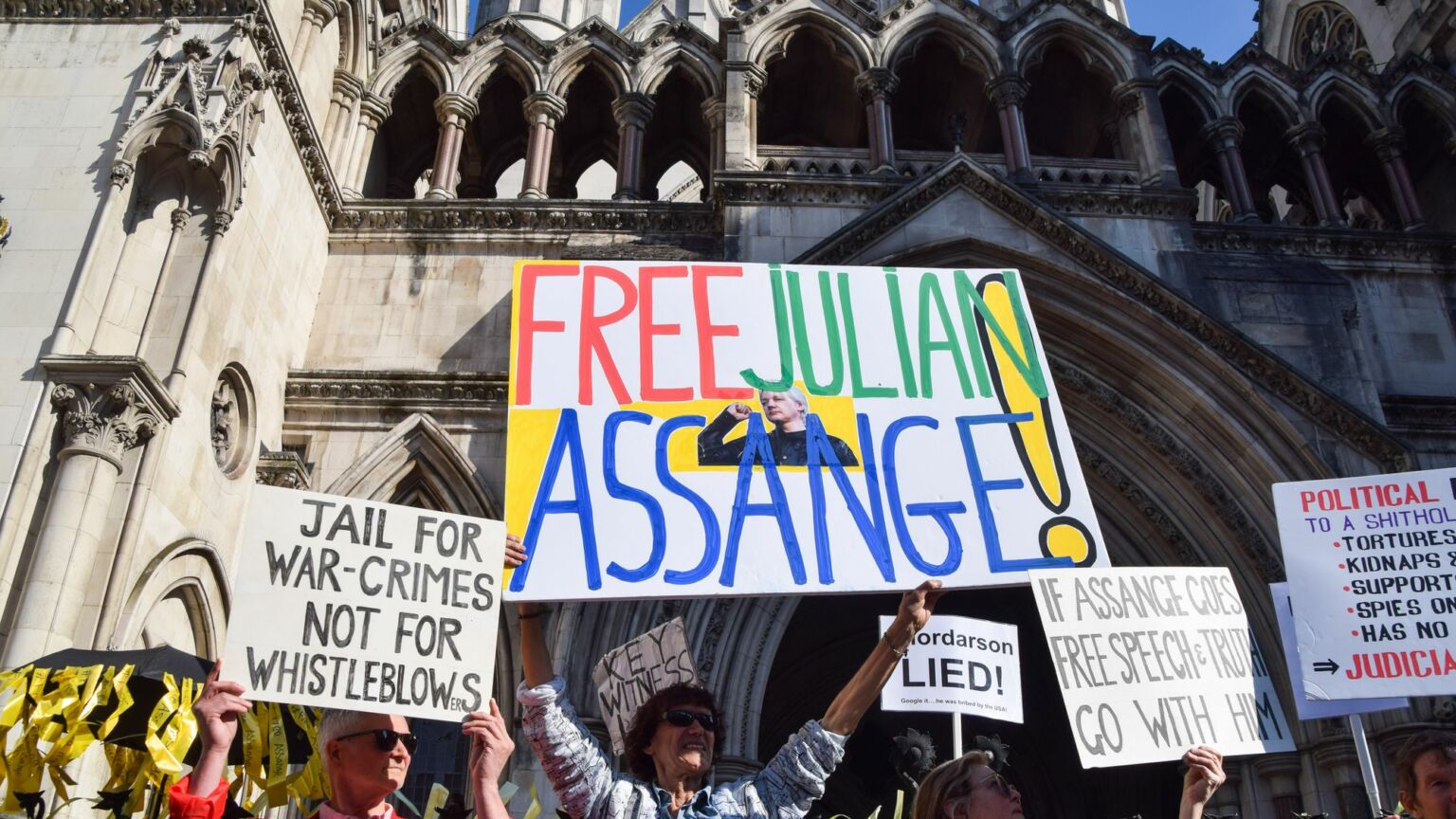Julian Assange’s fight for freedom is far from over
The High Court has given the Wikileaks founder a much-needed reprieve in his battle against extradition.

Want to read spiked ad-free? Become a spiked supporter.
There were hugs, kisses and cheers outside the Royal Courts of Justice on London’s Strand, when the UK High Court handed down its ruling in favour of Julian Assange yesterday. The founder of Wikileaks can now bring a new appeal against the order that he should be extradited to the United States. The US wants to try him on 17 charges of espionage and one of computer misuse, all related to Wikileaks’ publication of classified material. If found guilty there, he could face up to 175 years in prison.
The High Court ruling is unusual in several respects. For a start, there was the tenacity of the judges. Their persistence in probing the extent and reliability of US assurances about the treatment of Assange, should he be extradited, was unusual. They were clear from very early on that Assange should face a fair trial and that he should not face the death penalty (excluding the death penalty is a common UK requirement in US extradition requests). But they also interrogated other quite technical, legal issues.
For one, they wanted to know whether Assange, as a non-US national, would be able to benefit from a First Amendment or free-speech defence. The US was unable to offer any assurances that he would. They also wanted to know whether the charges on which the US was seeking Assange’s extradition might be added to, or changed to, say, full-blown spying, once he arrived. The US assured the court that the charges would not be changed. Overall, though, it seems that the judges were unconvinced that Assange would have a fair trial and have his right to freedom of expression protected in the US.
This ruling might also say something about a shift in relations between the US and the UK. The UK-US extradition treaty still exists, of course, so the two nations remain formally aligned. But in addition to this ruling, there is some evidence from diplomacy that the two countries are not quite as solidly joined at the hip as they once were.
In the past few months alone, the UK has diverged from the US over calls for a ceasefire in Gaza, voting differently in the UN on several resolutions. In February, UK foreign secretary David Cameron chided the US Congress for the delay in authorising new aid for Ukraine. Seen in this context, the High Court judgement in favour of Assange may have a deeper political significance.
The ruling is certainly good news for Assange. But his fight for freedom is far from over. The High Court has simply allowed the legal fight to go on. The question at issue in this latest ruling was not directly about halting Assange’s extradition. It was about giving him a new chance to appeal in the British courts, rather than take his case to the European Court of Human Rights, which is what he was expected to do, had he lost. What’s more, even though the UK Supreme Court does not typically rule on extradition cases, this case might be considered of such importance that the prospect cannot be entirely ruled out.
The appeal will be every bit as hard-fought as the proceedings thus far. It will also rest on many of the same arguments, with questions about the likelihood of a fair trial being central, and the territorial limits of jurisdiction. What right, after all, does any US court have to try a foreign national for actions that were undertaken in another country? (Assange is an Australian citizen and Wikileaks published its biggest scoops in Sweden.)
There is a small chance that the case ends right here. In the light of the latest decision, the US could well decide to stop proceedings against Assange. Even before this week’s ruling, the US and Australia were reportedly discussing a diplomatic deal, in which the US would drop its extradition request and allow Assange to return to his native Australia. This idea flitted only briefly across the media horizon, but it was never convincingly denied. Biden even said he was considering the proposal.
There are good reasons why the US could be tempted to drop the case against Assange. The prospect of losing a high-profile case in which the US was so heavily invested will worry the Biden administration. It might therefore want to clear the decks of potential embarrassments in the run-up to November’s presidential election.
Such a diplomatic compromise could also suit the UK. Assange’s continued detention – now five years in a top-security prison without trial – is a serious impediment to the UK’s image of itself as a model of media freedom and the rule of law.
For the moment, the legal wrangling looks set to go on. But for almost the first time in this marathon legal duel, Assange has a slight advantage.
Mary Dejevsky is a writer and broadcaster. She was Moscow correspondent for The Times between 1988 and 1992. She has also been a correspondent from Paris, Washington and China.
Picture by: Getty.
Who funds spiked? You do
We are funded by you. And in this era of cancel culture and advertiser boycotts, we rely on your donations more than ever. Seventy per cent of our revenue comes from our readers’ donations – the vast majority giving just £5 per month. If you make a regular donation – of £5 a month or £50 a year – you can become a and enjoy:
–Ad-free reading
–Exclusive events
–Access to our comments section
It’s the best way to keep spiked going – and growing. Thank you!










Comments
Want to join the conversation?
Only spiked supporters and patrons, who donate regularly to us, can comment on our articles.